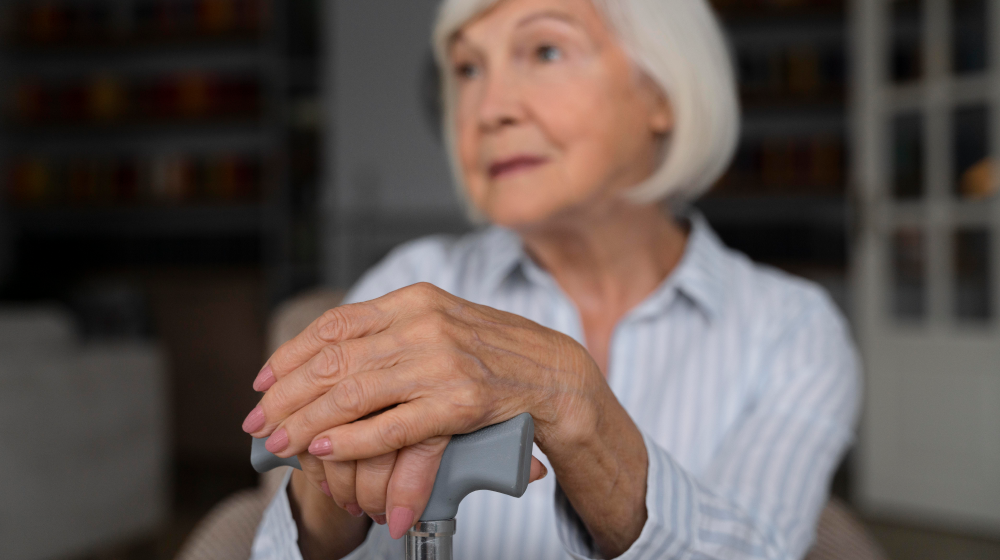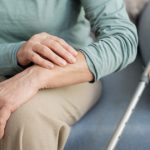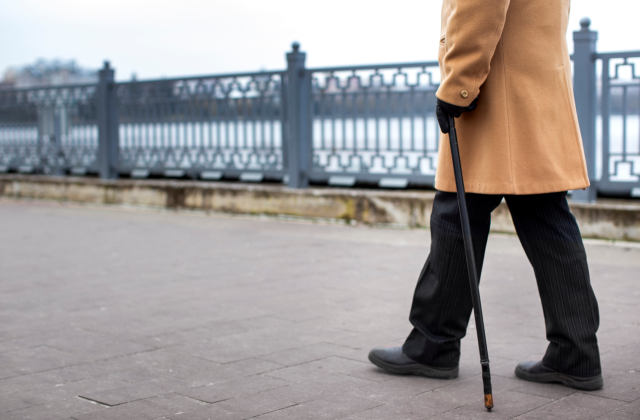Practical Solutions for Senior Care: How to Handle Mobility Issues in Older Adults
With age, a person’s ability to move around can be one of the hardest things to maintain. Often, mobility issues in older adults affect someone’s ability to engage in daily activities and impact their quality of life, leading to a reduced sense of personal independence, limited participation, and overall well-being. Regardless of whether your mobility challenge is due to illness, injury, or a normal part of aging, finding the right solutions that maintain or restore mobility is important.
At Angel Care Personal Care Assistance, we recognize how difficult it can be to manage loss of mobility in elderly individuals. With proper including strategies, physical therapy, and mobility aids, we can provide independence back to seniors that will help them live a more comfortable life in their home.
Understanding Mobility Problems in The Elderly
Mobility problems in older adults may have many factors that contribute to their inability to get around. Further, mobility issues can stem from both age-related changes and chronic conditions (such as arthritis or stroke), as well as general weakness. These problems may create difficulties with walking and standing and, issues with basic mobility skills associated with daily activities such as using the bathroom or getting in and out of bed.
While mobility problems are a natural part of aging, recognizing mobility problems and treating them effectively may create some improved outcomes for the elderly and allow them to gain a degree of independence in their lives.

Solutions for Senior Mobility Issues – Working to Restore Senior Mobility
Physical Therapy for Senior Mobility
Continuing to explore the best types of treatment for mobility problems, physical therapy is one of the best treatments. With physical therapy, we can devise a program of individualized exercises that can improve strength, balance, and flexibility. A physical therapist can create a tailored exercise program to address mobility, to assist with fall prevention, and to accommodate individual needs.
Quote:
“Physical Therapy is one of the best ways to increase the mobility and independence of your senior population when focusing on rehabilitation and prevention.” — Angel Care Inc.
Top Mobility Aids for the Elderly
Mobility aids are an essential component of safe mobility for many seniors! There are several types of aids available, based on how much support is needed:
- Canes and Walking Sticks: The best option for seniors that are still mobile, need some minimal support, but can have balance problems.
- Walkers: A good option for when a senior needs more assistance to walk safely. A walker provides a larger base of support.
- Wheelchairs and Rollators: These are for seniors that may not be able to walk long distances or stand for long periods.
- Stairlifts: These are an option for seniors that have weaknesses preventing them from walking in the stairs or have joint issues.
When identifying the right mobility aid, you will need to assess the elderly individual’s needs, as well as their lifestyle, along with the amount of support needed to be comfortable.
Managing Mobility Loss in the Elderly: A Step-by-Step Method
- Assessment and Diagnosis
Before starting any plan for improving mobility, honestly assess the senior’s lifestyle. This starts with a comprehensive assessment, including assessing the individual’s physical health, mobility restrictions, and overall lifestyle. Partnering with a medical professional or a home care provider can assist with development of a personalized plan.
- Creating a safe home environment
At home, it is important to create a mobility friendly home environment to eliminate hazards and encourage mobility. This can include:
- Cleaning out walls and floors to ensure pathways are clear
- Installing grab bars in bathroom and stair areas
- Never using throw rugs, or if using non slip throw rugs anchored with velcro
A designed home environment can lead to a safer and more mobility friendly space.
- Getting seniors to do mobility exercises at home
Getting seniors to do mobility exercises at home as part of their daily life can help them keep some flexibility and strength. For example:
- Chair exercises – strengthening of lower body muscles in a chair.
- Balance exercises – practicing standing on one foot or being stable walking heel to toe.
- Stretching – flexibility in legs, arms and torso.
“Exercise is the best and kindest way to maintain and even improve mobility in seniors: even basic chair exercises will go a long way to getting seniors to be more independently mobile.” – Angel Care Inc.
Home Care for Seniors with Mobility Issues
When mobility is drastically reduced to the point of being home bound it is critical to seek some home care services for assistance and support. At Angel Care Inc. we work with families to create personalized in home care to support them with all activities of daily living to allow seniors to maintain as much independence as able.
What is included in home care for mobility issues?
- Personal Care Assistance: Assistance with bathing, dressing and grooming.
- Mobility Assistance: Help with getting in and out of bed, walking, and using mobility aids.
- Medication Management: Making certain seniors take prescription meds on time or pain relievers needed for mobility issues.
- Companionship: Helping minimize loneliness by stimulating interaction and mental well-being.
The Caregiver’s Role in Supporting Elderly Mobility
Family caregivers are vitally important in the support of seniors experiencing mobility problems. They not only help seniors with physically difficult tasks such as getting out of a chair, but help seniors with emotional support, motivation and the ability for seniors to stay physically and actively engaged in their own homes.
Quote:
“A caring caregiver is essential for aging adults with mobility issues because they help them live with dignity and independence.” – Angel Care Inc.
Key Tips for Families Supporting Aging Adults with Mobility Issues
If you are a family member or loved one of a senior with mobility issues, here are a few helpful tips for you when caring for a senior:
- Encourage Regular Movement: Don’t become sedentary – just taking a few steps will keep the from deteriorating.
- Use Mobility Aids: Help your loved one choose the best mobility aids for their individual needs.
- Identify and Manage Health Conditions: Chronic conditions like arthritis or diabetes can compound mobility limitations so those need to be addressed with a health care provider.
- Maintain a non-threatening environment: be supportive and calm, demonstrate reassurance and ensure the home allows easy access to safe mobility.
Supporting Seniors in Mobility Issues
Mobility issues in seniors can be challenging; however there are ways to increase their quality of life. A great deal can be accomplished from physical therapy and mobility aids, home care and appropriate exercises, but addressing mobility challenges is a holistic approach requiring timed compassion, knowledge and the best supports.
Angel Care Inc. NY can provide the individual care seniors need to manage their mobility issues. If you or your loved one is experiencing mobility loss, please consider contacting us, we would love to share our guidance, professional care and support!

From the Professionals at Angel Care Inc., NY With increasing age, being independent is the most cherished for the majority of seniors. At New York's Angel Care Inc., we understand the importance of staying independent while, simultaneously, ensuring the safety and well-being of the elderly. Our caregivers and professionals are committed to providing home care to ensure senior independence, which allows seniors to remain at home and live comfortably and with dignity. In this article, we’ll explore practical caregiving tips to promote senior independence, offer advice on home modifications for independent living, and discuss how technology to support senior independence can empower seniors to live on their terms. Why Maintaining Independence in Elderly is Crucial A desire to be independent is a desire that is shared by everyone, and it does not change across age groups. For the elderly, being independent is in proportion to their psychological and mental health. Independence has been found to reverse the tide of depression, loneliness, and worry, which are common among the elderly. But helping the old to live independently requires good planning, support, and appropriate facilities. We at Angel Care Inc. believe in a holistic approach to home care for independent aged individuals, offering services that are tailored to each individual's personal needs. Independent Living Tips for Seniors Following are some tips on caregiving to maintain senior independence, gained from experience: Encourage Regular Physical Activity Exercise regularly to maintain strength, balance, and flexibility, reducing the risk of falls. Gentle exercising through activities like walking, stretching, or yoga can easily be incorporated into daily life. Meal Preparation Assistance Independent living does not mean that seniors need to do any activity on their own. Meal planning and preparation help ensure that seniors get proper nutrition without feeling overwhelmed. Maintain a Routine Consistency is the secret to maintaining seniors' mental acuteness and on an even keel. A daily routine keeps them feeling a sense of normality and being independent. Encourage social interaction It is vital to be socially active. Encourage seniors to stay in touch with friends, family, and community organizations, because social isolation can lead to depression and dementia. Home Care to Help Senior Independence Independent elderly home care is a treasured commodity for families who want to preserve their loved one's independence. We at Angel Care Inc. offer a wide range of services designed to enable seniors to be independent and receive the care they need. Below are some of the ways that our home care services help with elderly independence: Service How It Supports Independence Personal Care Assistance (PCA) Helps with bathing, dressing, and grooming, promoting dignity and self-esteem. Medication Management Aids in ensuring medication is taken correctly and on time, precluding unnecessary hospitalization. Companionship Provides social contact and emotional support, warding off loneliness and fostering mental health. Light Housekeeping Helps keep the home environment clean and well-organized, reducing the risk of accidents and improving security. All these services help provide elderly persons with a safe and independent way of living, unencumbered by the hardships of daily living. Home Modifications for Independent Living Modifying home to accommodate seniors can be a huge improvement in their independent living. Below are some independent living home modifications that can enhance safety and functionality: Install Grab Bars in the Bathroom: These offer additional support in getting in and out of the shower or bathtub, minimizing the chances of falls and slips. Provide Sufficient Lighting: Sufficient, even lighting avoids the senior from tripping on items and falling, making it an extremely necessary feature in a safe home for seniors. Clear Passages: Clear passages of anything that can be a hindrance, such as rugs or clutter, to provide a secure environment. Bed Height Adjustment: Beds which are either too high or low may be uncomfortable for seniors when entering or exiting. Bed height adjustment may aid in safe mobility. Technology to Foster Elder Independence Technological developments have made living independently easier than ever for the elderly. The right technology has the ability to improve safety, convenience, and peace of mind for seniors and their families as well. Some of the technologies that we recommend are: Fall Detection Systems: Wearable devices that can alert caregivers automatically when a fall is detected, so that the response is quick. Remote Medication Reminders: Equipment and apps that prompt older adults to take medication at the correct time, avoiding missing a dose. Smart Home Devices: Voice-operated devices like Amazon Alexa or Google Home allow older adults to control lights, heating, and appliances from the comfort of their sitting position, avoiding unnecessary mobility. Telehealth Services: Older adults will be able to visit their physicians at home, cutting down on travel and enabling immediate care. These technologies allow older adults to remain at home more independently and securely. Ask Angel Care Inc for help today! Sustaining independence as we age is the essence of a happy life. At Angel Care Inc., we are committed to helping the elderly sustain independence using home care to provide senior independence and practical caregiving guidance to enable senior independence. With adequate support, resources, and accommodations, seniors can continue to do well at home. If you or your family member is looking for expert advice in remaining independent at home, independent aging in-home care, or consultation regarding home modifications for independent living, contact Angel Care Inc. today. We are here to assist in making aging in place not just possible but secure and a rewarding experience.

Arthritis among seniors is a common problem that affects mobility, comfort, and quality of life. Let’s be honest, if you or your loved one is afflicted with arthritis it can feel overwhelming at times. The good news is that with the right care and support managing arthritis is a realistic possibility. This article will provide some feasible arthritis care for elderly strategies including pain relief, exercises and treatment that can be done at home, to enhance quality of life. What is Arthritis and why is it an issue for seniors? Osteoarthritis and rheumatoid arthritis are the 2 forms of arthritis which cause pain, stiffness and inflammation in the joints. Arthritis in its various forms,curtails the mobility of elderly individuals making performing daily tasks difficult. Managing arthritis for elderly individuals is not solely about relieving pain, it is about maintaining independence and quality of life. Arthritis Pain Relief for seniors: In-home Care Strategies Managing arthritis in seniors requires a multifaceted approach. While medication may help, there are many in-home strategies that provide a substantial amount of relief. Method How It Helps Heat and Cold Therapy Decreases pain and inflammation in the joints Massage Therapy Increases circulation and relaxes tight muscles Diet and Supplements Omega-3s and Glucosamine curb inflammation Mind-Body Connection Yoga and mediation relieve stress which lessens pain By utilizing these simple methods, and combining those with an adequate arthritis treatment for elderly at home, it allows seniors to find relief without overly relying on medication. Senior Home Exercises for Arthritis: Move to Improve Exercise is a great way for seniors to manage arthritis. While it might sound like motion is contraindicated when you’re in pain, gentle movement will improve joint flexibility and decrease stiffness. Exercise Benefit Low-Impact Activities Walk, swim, bike, or any other activity that increases mobility, as long as it is low impact on the joints. Strength Training Light weights or resistance bands, to strengthen the muscles around the joints. Range-of-Motion Exercises Improves joint flexibility, and reduces stiffness. These senior home exercises for arthritis can be performed daily and modified to a person's ability. Simply moving whatever joints you can will have significant positive benefits. Arthritis Treatment for Elderly at Home: Medications are Not the Only Solution When Thinking About Arthritis In providing arthritis treatment for elderly at home, medications are a big part but they won't solve everything. Grasping of a few different ways cope with this problem: Method How It Helps Physical Therapy A therapist can provide you with exercises, that are specific to you, to improve stamina, mobility, and pain. Assistive Devices Braces that help support joints while doing activities, canes for walking, etc. Pacing and Rest Helps to prevent overdoing activity and to reflect and decrease energy and flare-ups. Tips for Living with Arthritis in the Elderly: Small Things Make One Hell of a Difference Here are a few small things that can make a big difference for seniors living with arthritis: Tip How It Helps Use Adaptive Devices Anything that can assist you, or make a task easier, for example jar openers or walking aids. Warm Up Before Activity Allows your joints to get ready to do some form of movement which lowers risk of injury. Be Consistent Building routines into your self-care will help you get the most value out of all the things that you do, and build long-term consistency. These small changes, in conjunction with adequate arthritis support in home care, will help independence and improve life for seniors with arthritis. Enabling Seniors Living with Arthritis Living with arthritis does not need to mean you can no longer live an active, full, and autonomous life! With the right arthritis care for elderly, they can stay active and maximize comfort and independence. At Angel Care Inc. PCA unit, we’re dedicated to providing arthritis treatment for elderly at home, enabling seniors to live a life with less pain and more mobility. By participating in senior home exercises for arthritis, utilizing assistive devices, and practicing self-care, seniors will need less medication, experience far fewer symptoms, and maintain or improve their mobility. Let’s help our loved ones get a grip on their arthritis and live with less pain and more life, with the support of Angel Care Inc.!



